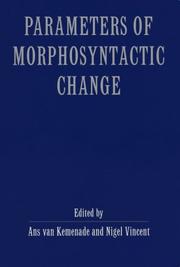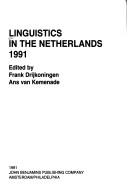| Listing 1 - 8 of 8 |
Sort by
|

ISBN: 0521586437 0521584027 Year: 1997 Publisher: Cambridge : Cambridge university press,
Abstract | Keywords | Export | Availability | Bookmark
 Loading...
Loading...Choose an application
- Reference Manager
- EndNote
- RefWorks (Direct export to RefWorks)
Historical linguistics --- Grammar --- Changement (Linguistique) --- Changement linguistique --- Generatieve spraakkunst --- Generative grammar --- Grammaire générative --- Grammaire transformationnelle --- Grammar [Comparative and general ] -- Derivation --- Grammar [Generative ] --- Grammar [Transformational ] --- Grammar [Transformational generative ] --- Grammatica [Generatieve ] --- Grammatica [Transformationele ] --- Langage--Changement --- Langage--Evolution --- Langues--Changement --- Langues--Evolution --- Linguistic change --- Spraakkunst [Generatieve ] --- Spraakkunst [Transformationele ] --- Taal--Evolutie --- Taal--Verandering --- Taalevolutie --- Taalverandering --- Talen--Evolutie --- Talen--Verandering --- Transformational generative grammar --- Transformational grammar --- Transformationele grammatica --- Transformationele spraakkunst --- Transformationele taaltheorie --- Évolution linguistique --- Generative grammar. --- Grammar, Comparative and general --- Linguistic change. --- Morphology. --- Syntax. --- Change, Linguistic --- Language change --- Language and languages --- Syntax --- Morphology (Linguistics) --- Grammar, Generative --- Grammar, Transformational --- Grammar, Transformational generative --- Psycholinguistics --- Morphology --- Derivation --- Grammar [Comparative and general ] --- Linguistics --- Philology --- Grammar, Comparative and general Syntax --- Grammar, Comparative and general Morphology

ISBN: 9027231516 Year: 1991 Publisher: Amsterdam ; Philadelphia : Benjamins,
Abstract | Keywords | Export | Availability | Bookmark
 Loading...
Loading...Choose an application
- Reference Manager
- EndNote
- RefWorks (Direct export to RefWorks)
Book
ISBN: 9067654205 Year: 1989 Publisher: Dordrecht : Foris,
Abstract | Keywords | Export | Availability | Bookmark
 Loading...
Loading...Choose an application
- Reference Manager
- EndNote
- RefWorks (Direct export to RefWorks)
Book
Year: 1993 Publisher: Amsterdam London Tokyo Elsevier Science Publishers
Abstract | Keywords | Export | Availability | Bookmark
 Loading...
Loading...Choose an application
- Reference Manager
- EndNote
- RefWorks (Direct export to RefWorks)
Book
ISBN: 9090143777 Year: 2000 Publisher: Nijmegen : Katholieke Universiteit Nijmegen,
Abstract | Keywords | Export | Availability | Bookmark
 Loading...
Loading...Choose an application
- Reference Manager
- EndNote
- RefWorks (Direct export to RefWorks)
Multi
ISBN: 9781107012639 9781139421843 1139421840 1107012635 0511998449 9780511998447 9781316604823 1139411454 1107229286 1280682973 9786613659910 1139422812 113941979X 1139417746 1139423886 9781139423885 1316604829 Year: 2012 Publisher: Cambridge Cambridge University Press
Abstract | Keywords | Export | Availability | Bookmark
 Loading...
Loading...Choose an application
- Reference Manager
- EndNote
- RefWorks (Direct export to RefWorks)
Particle verbs (combinations of two words but lexical units) are a notorious problem in linguistics. Is a particle verb like look up one word or two? It has its own entry in dictionaries, as if it is one word, but look and up can be split up in a sentence: we can say He looked the information up and He looked up the information. But why can't we say He looked up it? In English look and up can only be separated by a direct object, but in Dutch the two parts can be separated over a much longer distance. How did such hybrid verbs arise and how do they function? How can we make sense of them in modern theories of language structure? This book sets out to answer these and other questions, explaining how these verbs fit into the grammatical systems of English and Dutch.
Grammar --- Grammar, Comparative and general --- Morphosyntax --- Particles --- Suffixes and prefixes --- 802.0-56 --- 803.93-56 --- Engels: syntaxis; semantiek --- Nederlands: syntaxis; semantiek --- Language and languages. --- Particles. --- Suffixes and prefixes. --- 802.0-56 Engels: syntaxis; semantiek --- 803.93-56 Nederlands: syntaxis; semantiek --- Morphosyntax. --- Prefixes --- Particles (Grammar) --- Morphosyntactic features --- Affixes --- Function words --- Morphology --- Syntax --- Grammar, Comparative and general Particles --- Arts and Humanities --- Language & Linguistics --- Linguistics --- Philology --- Grammar, Comparative and general - Morphosyntax --- Grammar, Comparative and general - Particles --- Grammar, Comparative and general - Suffixes and prefixes
Book

ISBN: 9783110557916 9783110560299 9783110558050 311055805X 3110560291 3110557916 Year: 2018 Publisher: Berlin Boston
Abstract | Keywords | Export | Availability | Bookmark
 Loading...
Loading...Choose an application
- Reference Manager
- EndNote
- RefWorks (Direct export to RefWorks)
Atypical demonstratives have not received adequate attention in the literature so far, or have even been completely neglected. By providing fresh insights and discussing new facets, this volume contributes to the better understanding of this group of words, starting from specific empirical phenomena, and advances our knowledge of the various properties of demonstratives, their syntactic multi-functionality, semantic feature specifications and pragmatic functions. In addition, some of the papers discuss different grammaticalization processes involving demonstratives, in particular how and from which lexical and morphosyntactic categories they originate cross-linguistically, and which semantic or pragmatic mechanisms play which role in their emergence. As such, the different contributions guide the readers on an adventurous journey into the realm of different exotic species of demonstratives, whose peculiar properties offer new exiting insights into the complex nature of demonstrative expressions themselves.
Grammar, Comparative and general --- Demonstratives. --- Demonstratives (Grammar) --- Indexicals (Semantics) --- Demonstratives --- Deixis --- Determiners --- Lexicology. Semantics --- Grammar --- Pragmatics --- E-books --- Linguistics --- Philology --- Deixis. --- Determiners.
Book

ISBN: 9783110251593 3110251590 3110251604 9783110251609 9783110251609 9783110202205 9783110202656 3110202654 3112146697 3110202204 9783112146699 Year: 2012 Volume: 34/1-2 34/1-2 34/1-2 Publisher: Berlin Boston
Abstract | Keywords | Export | Availability | Bookmark
 Loading...
Loading...Choose an application
- Reference Manager
- EndNote
- RefWorks (Direct export to RefWorks)
n.a.
Historical linguistics --- English language --- English language -- Etymology. --- English language -- History. --- Historical linguistics. --- English --- Languages & Literatures --- English Language --- History --- Diachronic linguistics --- Dynamic linguistics --- Evolutionary linguistics --- Language and languages --- Language and history --- Linguistics --- History. --- Etymology --- Word history --- Germanic languages --- English language - History --- English Linguistics. --- Language History.
| Listing 1 - 8 of 8 |
Sort by
|

 Search
Search Feedback
Feedback About UniCat
About UniCat  Help
Help News
News